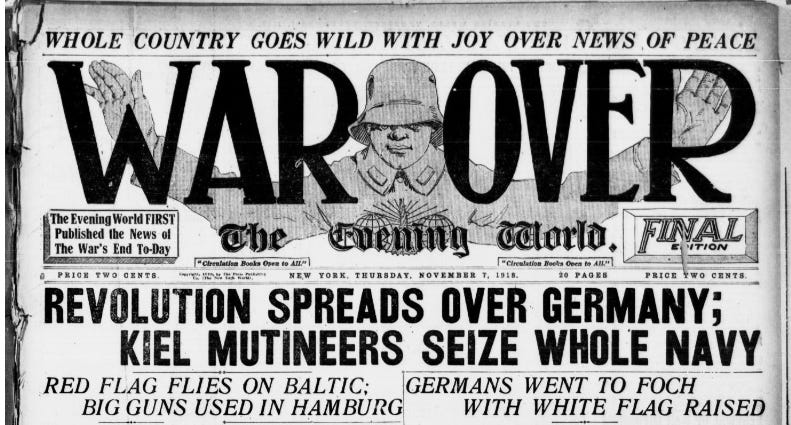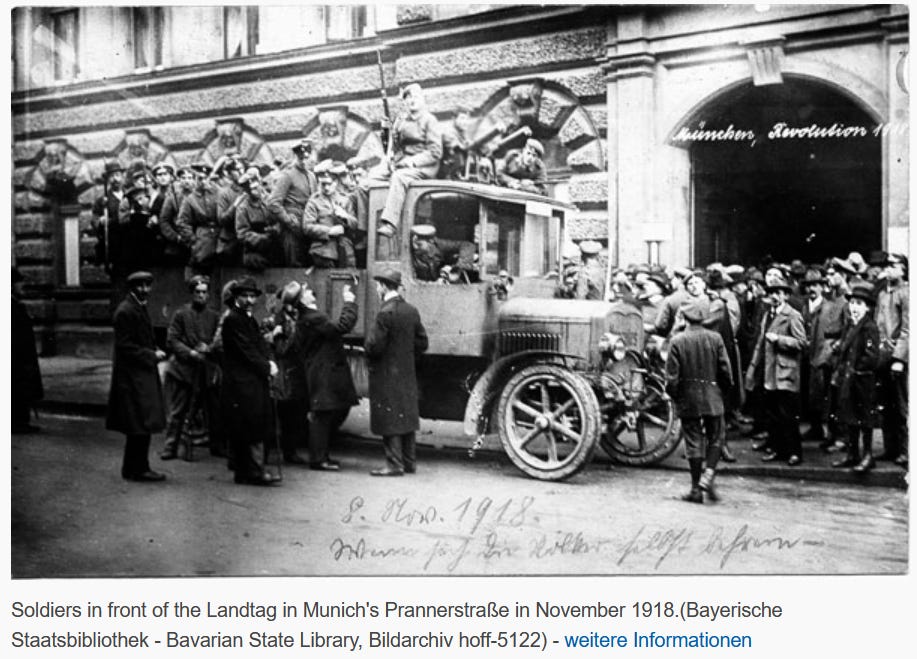Chapter 4: Problems of Peace and Order
FbF Book Club: Revolution in Bavaria, 1918-1919 (Mitchell, 1965)
Previous Entry - Chapter 3: The November Revolution
The more I think about the November Revolution, the more farcical it seems to me. Eisner consulted and conspired with around twelve men in the lead up to the momentous day, and then simply led a segment of the demonstration in the opposite direction from the rest. Mitchell describes the events of that day as both “arresting” and “bizarre”, but the ease with which power was seized in Munich brings to my mind the picture of a brazen shoplifter daring the store owner to do something about his theft while in the act of doing it.
The paralysis of the Bavarian regime in its inability to do something to stop Eisner in his tracks was in the main a product of the shock that the whole of Germany was experiencing in learning that their war effort had collapsed. This shock turned into disgust with and rage at the ruling authorities, resulting in the annihilation of confidence in their rule. This confluence of events allowed the shoplifter to walk through the open door and help himself to the products inside. Eisner simply capitalized on the opportunity that presented itself to him.
It’s one thing to seize power, and it’s another thing to rule. The fourth chapter of this book deals with the first few days of the Bavarian People’s State and how Eisner (especially) and his regime dealt with the two most pressing issues facing it: the need to instill order, and the question of peace with the Entente powers. Both of these issues are very important to the story, but this chapter as a whole serves as a bridge, which means that this entry will not be a long one.
Order At Home
Even though untested at the polling booth, Eisner’s socialists were less popular in Bavaria than the local SPD branch under Auer. The amount of support for Eisner and his putschists was therefore unknown, forcing the new regime to rely on those already in state administrative roles. This posed a significant problem, as their political sympathies were not clear. How would the bureaucracy react to the new boss?
Even before the question of functional administration could be tackled, an even more important matter had to be resolved: the question of legitimacy. Eisner took matters into his own hands and placed power in the cabinet:
Without recalling either council to obtain a formal enabling act, Eisner released a statement on November 10 which was intended to settle all questions of competence for the time being:
Through the resolutions of the provisional assembly of the councils of workers, soldiers, and peasants, the executive power has passed into the hands of the cabinet of the Bavarian People's State. Henceforth no decrees have the power of law which are not issued by the cabinet of ministers.. . . Within a few days everything will take its accustomed course.
There was no push back of significance to this, meaning that that the question of legitimacy in legal terms was immediately settled.
A decree was issued placing security services under the control of the Ministry of Military Affairs:
Henceforth this power would reside in the Ministry, to be exercised by Rosshaupter himself. All Munich police and "security forces" were, by decree, likewise brought under the direction of the new regime. The confusion had been extraordinary, with various units operating their own patrols under separate regulations and from different beer-halls and barracks. Six signatures were finally required on the governmental order to regulate the situation. Even so, the absence of a more clearly defined and unified command continued to hamper the housing, feeding, and demobilization of the thousands of troops which poured through Munich in November and December.
A decree is one thing, but reality is a different matter:
In reality, the headquarters of the three Bavarian army corps stationed at Munich, Nuremberg, and Wiirzburg were virtually autonomous and uncommitted politically. There were at first few important changes in military command at the top level, apart from Rosshaupter, and his position was obviously no more secure than that of the regime itself.
The confusion of the first weeks of the new regime gave Eisner breathing room with the military, but Mitchell informs us that by December relations would sour rapidly.



